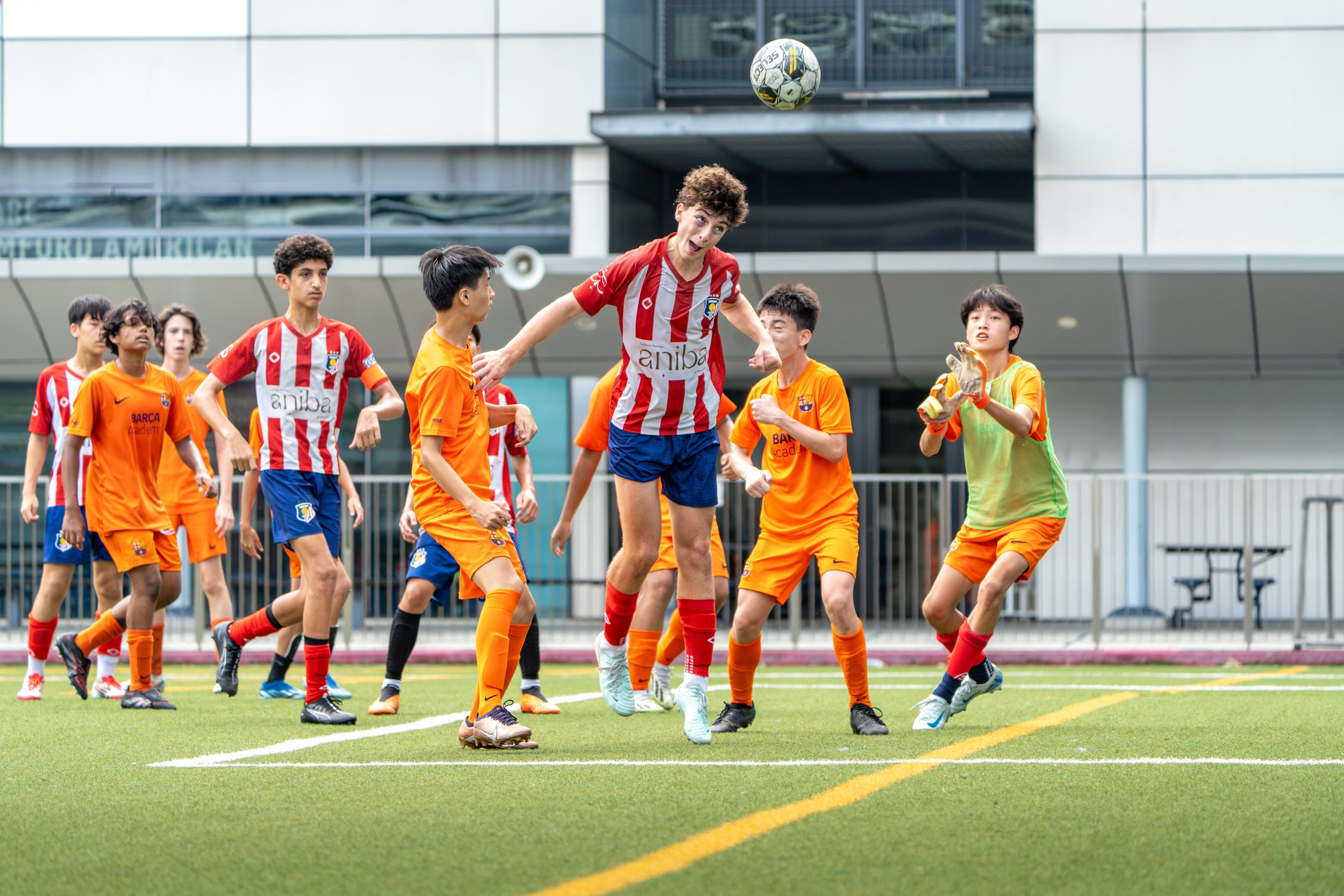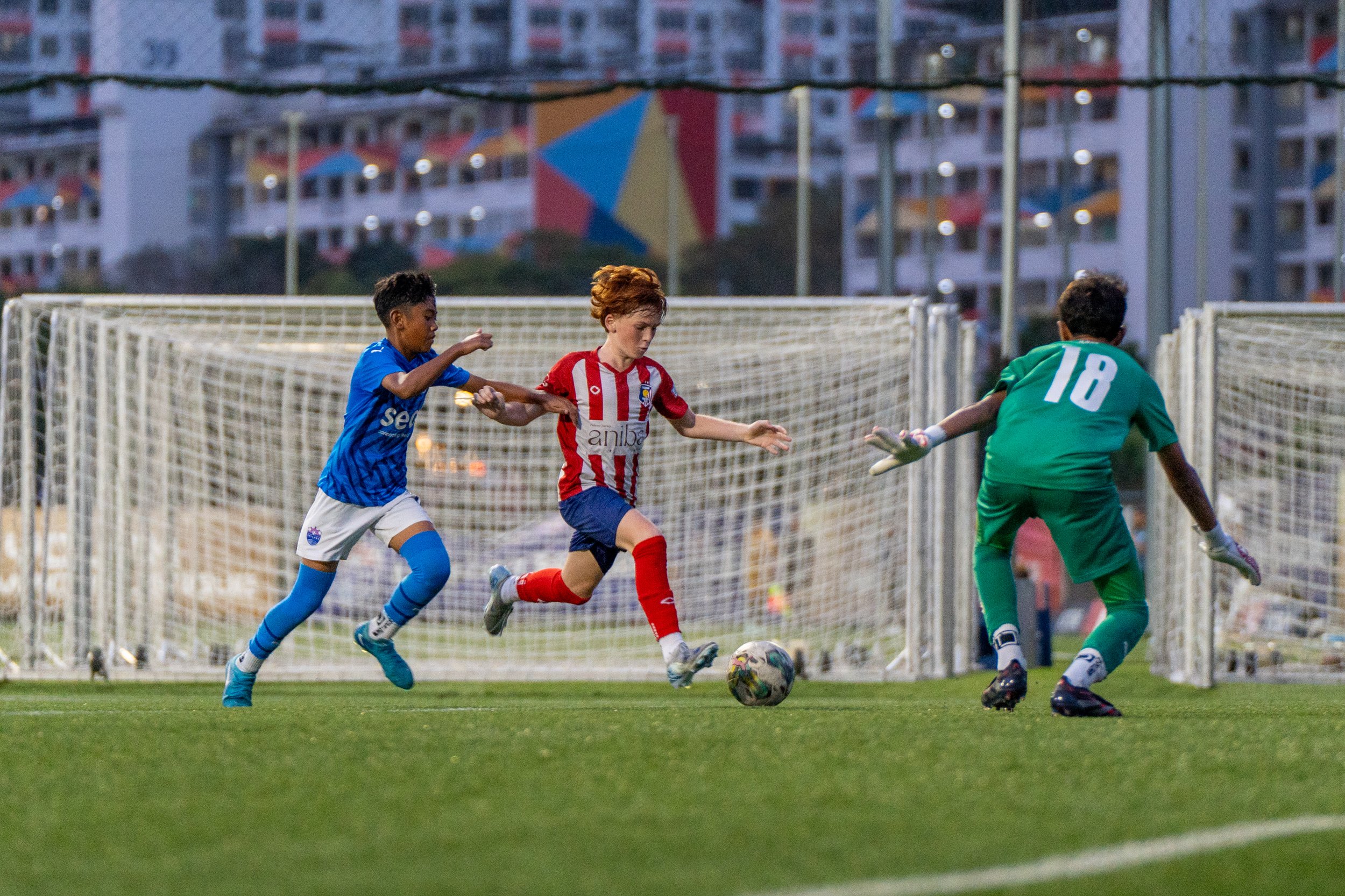Our Approach
Our methodology, inspired by Europe’s top professional clubs, is designed to develop players through a structured, age-specific approach.
How we implement our Methodology
We use tailored pathways, customized training, and holistic development to help players reach their full potential.
Step 01
Age-Specific Pathway
We follow a proven, year-long development plan inspired by top European clubs, ensuring players learn age-appropriate skills for maximum growth.
Step 02
Customized Training Sessions
Our training sessions are tailored to each team and age group, helping players and coaches achieve specific goals effectively.
Step 03
Holistic Player Development
Our program focuses on technical, physical, and mental growth, giving players the tools to succeed both on and off the field.
Football, tailored for every age.
We develop young footballers aged 4-16 using proven European training methodologies, focusing on overcoming key challenges.
Stage 1
from 4 to 6 years old
For the tittle ones, we focus on an introduction to Football and movement with a lot of fun and also engaging parents to the training sessions.
Introduction to Football, Exploration and Fun
Key Focus: Building enthusiasm for football and basic motor skills.
What They Learn:
Fundamental movement skills: running, jumping, balancing, and coordination.
Introduction to the ball: dribbling, stopping, kicking, and basic control.
Early social skills: playing with teammates and following simple instructions.
Approach (example):
Play-based, unstructured activities that focus on enjoyment.
Small-sided games (2v2 or 3v3) to ensure maximum involvement.
Short, engaging sessions (30-45 minutes) to suit attention spans.
Stage 2
from 7 to 8 years old
This age group thrives on energy and fun, with training focused on games that nurture a love for football. Basic skills like dribbling and passing and receiving the ball are naturally refined as children explore their instinctive connection to the ball.
Foundation Building
Key Focus: Developing basic technical skills and understanding simple game concepts.
What They Learn:
Core technical skills: passing, receiving, dribbling, and shooting.
Spatial awareness: understanding where to move and positioning.
Teamwork and basic communication on the pitch.
Approach (example):
Sessions focus on repetition of skills in a fun and pressure-free environment.
Small-sided games (3v3 or 4v4) to encourage touches on the ball and decision-making.
Positive reinforcement to build confidence and love for the game.
Stage 3
from 9 to 10 years old
At this age, improved focus and precise movement enable the introduction of more advanced technical and basic tactical elements. The children increase the confidence, motivation and will desire to perform better and understand the game.
Skill Development and Game Awareness
Key Focus: Refining technical abilities and introducing tactical concepts.
What They Learn:
Advanced ball control: using both feet, feints, and turns.
Tactical basics: spacing, passing lanes, and simple formations.
Decision-making under pressure in game situations.
Approach (example):
Small-sided games (3v2 or 5v3) to simulate real match scenarios.
Individual skill work combined with team exercises.
Emphasis on creativity and problem-solving.
Stage 4
from 11 to 13 years old
By this stage, players should have strong technical skills, allowing focus on advanced tactics. It’s the ideal time to enhance coordination, quickness and agility, with players showing courage and readiness to learn complex movements, emotionally and stronger competitive spirit.
Tactical Awareness and Physical Development
Key Focus: Combining technical skills with tactical understanding and building physical fitness.
What They Learn:
Positional play: understanding roles and responsibilities in the game.
Team tactics: pressing, defending, attacking patterns, and transitions.
Physical conditioning: agility, strength, and endurance appropriate to their age.
Approach (example):
Structured training with clear objectives for each session and intensity.
Medium-sided games (3v2, 5v3 or 9v9) to incorporate more tactical elements.
Sessions begin to include feedback and video analysis for learning.
Stage 5
from 14 to 16 years old
Technical skills are refined with increased focus on tactics, tested in gameplay. Positional training introduces roles, while physical preparation emphasises strength, endurance, and solidifying habits as a Pro-athlete.
Performance Preparation and Specialization
Key Focus: Preparing for competitive environments and refining advanced skills.
What They Learn:
Advanced tactical systems: high-level positional play and team strategies.
Enhanced physical development: strength, speed, and injury prevention.
Mental aspects: resilience, focus, and dealing with pressure.
Approach (example):
Training mirrors professional setups with high intensity and competitive matches.
Emphasis on specialization in positions while maintaining versatility.
Detailed performance analysis using video and statistics.
Our focus areas
-

Psychology
Introduction to mental concepts: concentration levels, confidence and emotional control, intrinsic motivation and Teamwork.
Understanding of the role and link between practice training and game.
Sportsmanship: winning or losing gracefully but fighting until the end of the game and Team Spirit. -

Technique
Passing: short passing, long passing, wall and triangle passing, crossing the balls.
Receiving: on the ground, bouncing and air balls with laces and sole inside-outside of foot, tight and chest control.
Dribbling: change direction, close control, fakes/moves to beat opponents and shielding
Shooting: with laces, inside and outside of foot, placement vs power. -

Physical
Continue to develop basics of movement and coordination. Continue to develop speed, flexibility, power and endurance through games.
Warm-up (dynamic), Cooldown (static), Stretching (dynamic)
Basic core stability and strength development. -

Tactical
Defending: Pressure and covering defender, basic and advanced defensive concepts.
Attacking: passing patterns, basic and advanced combinations (wall passes).
Passing/Possession: Supporting angles, showing & hiding the ball, movement off the ball, timing of runs. -

Values
We foster a culture of respect, teamwork, and transparency, grounded in values like solidarity, commitment, equality, and motivation to inspire every player on and off the field.
Our training components
-

Football Drills
Focuses on specific movement skills and sprint/COD/heading
-

Max. Strength & Power
Emphasizes maximum strength and power development
-

General Movement Skills
Concentrates on jump/bound/hop movements
-

Specific Movement Skills
Focuses on sprint/COD/heading techniques
-

Explosive & Reactive Strength
Develops hypertrophy and explosive power
-

Core Stability & Breathing Pattern
Works on frontal/lateral/rotational movements
-

Landing Mechanics
Emphasizes athletic position and proper landing technique
-

Strength
Focuses on building endurance and overall strength
-

Power of Confidence
Addresses both collective and individual mindset of the team and players
-

Body Awareness
Own Body + Space - Develops understanding and control of body positioning and spatial awareness
Methodology Highlights for Parents
By following this structured and supportive approach, European academies aim to develop not just skilled footballers but also confident, disciplined, and resilient individuals.
Player-Centered: Training adapts to the child’s developmental needs and growth.
Age-Appropriate: Skills and concepts are introduced progressively to build a strong foundation.
Focus on Long-Term Development: The primary goal is to nurture well-rounded players prepared for the future.
Emphasis on Enjoyment: A love for the game is prioritized at all stages to ensure continued participation.
Conclusion for Parents
At EuroAsia FC, we are deeply committed to developing young players not only as footballers but also as well-rounded individuals. Our methodology ensures that your child progresses through age-appropriate stages, focusing on technical skills, tactical understanding, physical development, and mental resilience.
From the early years of playful exploration to the later stages of tactical mastery and physical conditioning, every step of the journey is designed to foster a lifelong passion for football and prepare them for future challenges. We emphasize teamwork, respect, and a strong work ethic, instilling values that will benefit your child on and off the pitch.
Parent’s Role: Support their child’s progress without focusing on results, fostering a positive attitude toward learning.
Thank you for entrusting us with your child's development. Together, we can support their growth, celebrate their progress, and help them reach their fullest potential both as players and individuals.
EuroAsia FC







